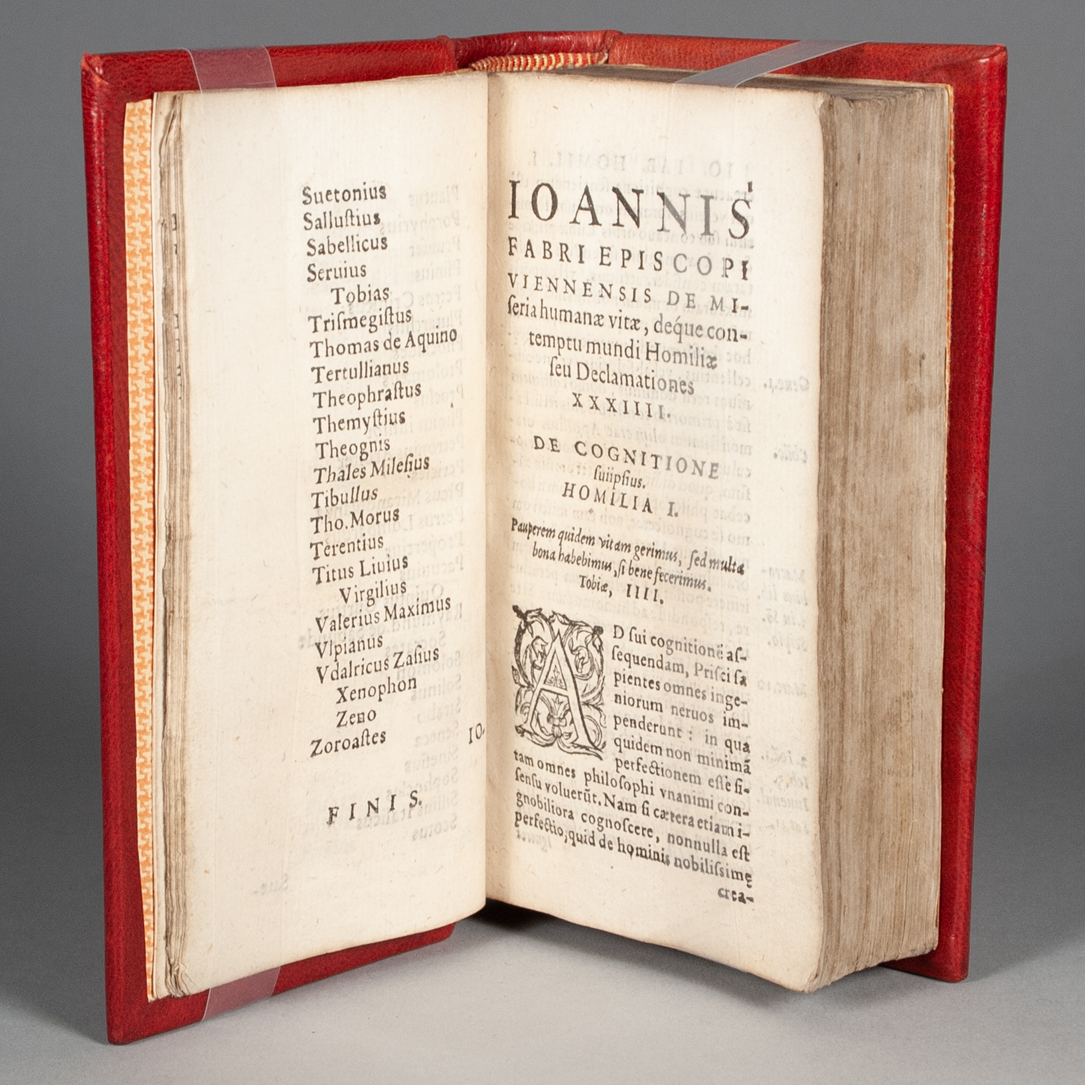Misery



Misery
De miseria vitae humanae, deque mundi contemptu homiliae XXXIIII, quarum argumenta sequenti pagina recensentur; Lilii Vicentini de fugacitate miseria & inconstantia vitae, & rerum humanarum, declamatio; S. Ioannis Chrysostomi libellus, quod nemo laeditur nisi à semetipso
by Johannes Faber | Zaccaria Lilio | Saint John Chrysostom
Antwerp: Jean Bellère, 1564
[10], 271, [1] leaves | 12mo | A-Z^12 2A^6 | 135 x 70 mm
Fourth edition, following those of 1520, 1528, and 1541, and the first to include Zaccaria Lilio’s De miseria et fugacitate vitae and Saint John Chrysostom’s Quod nemo laeditur nisi à se ipso. A collection of thirty-four sermons by the German Catholic theologian, who bore the sobriquet “hammer of heretics” for some of his work countering Protestant Reformers. The volume constitutes an early work dedicated entirely to the topic of human misery. Includes a six-page list of authors cited, replete with classical authors frequently invoked in the sermons. ¶ Faber’s homilies come with upbeat titles like, “On the misery of the envious man,” “On the misery of the repulsive lover,” and “Why pleasant people live with misery and desperation” (translated). His “On tribulations” offers a horrifying litany of afflictions. All begin by citing the same verse from the Book of Tobias, which is often incorporated elsewhere in his orations: “We lead indeed a poor life, but we shall have many good things if we do good.” The inverse, of course, is that those who lack good things may have simply failed to earn them—an attitude that for centuries shifted blame for chronic human suffering, due at least in part to widespread institutional injustices, squarely onto the shoulders of individual victims. ¶ For Chrysostom’s part, one scholar has called Quod nemo laeditur nisi à se ipso his “most philosophical and most sophisticated” treatise (Amand de Mendieta; translated). Chrysostom essentially argues that the human spirit possesses a force completely uncorruptible by outside injustices. Which is to suggest, grin and bear it? (Cue Matilda…) ¶ An informative early modern perspective on misery, composed at a time when accountability for human suffering too often stopped at one of two entities: the victim or an incontestable higher power. ¶ We locate no copies outside of Europe.
PROVENANCE: Contemporary Capuchin ownership inscription on title page, partially obliterated. Two mostly obliterated ink stamps on title page. ¶ Occasional early underlining; single marginalium on folio 143v. ¶ Initials VB in blind on the front cover.
CONDITION: Recent red leather, with a little tooling in both blind and gold; patterned endpapers. Printer’s device on last page; a few decorative initials. ¶ Spine faded a few shades. Title page moderately soiled; faint dampstain at the inner margin throughout. A strong, tightly bound copy.
REFERENCES: USTC 404418 ¶ Emmanuel Amand de Mendieta, “L’amplification d’un theme Socratique et stoïcien dans l’avant-dernier traité de Jean Chrysostome,” Byzantion 36.2 (1966), p. 354
Item #105
